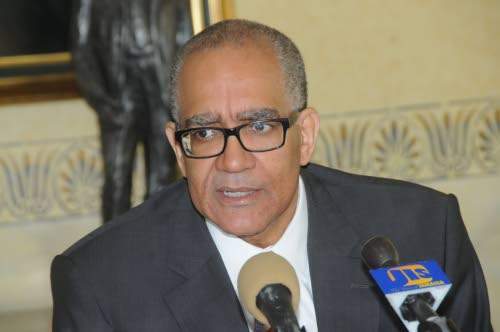BANK of Jamaica (BOJ) Governor Brian Wynter yesterday denied suggestions that the upward swing of the local currency was a strategy to encourage increased inflation.
“It is absolutely not true and it takes you down a wrong path, if you believe that’s what we are actually doing. We are not doing that,” Wynter insisted.
The central bank boss was responding to questions from journalists attending a press briefing called by Minister of Finance and the Public Service Dr Nigel Clarke, at his Heroes’ Circle office to explain the inflation issue.
Dr Clarke used the opportunity to release correspondence between himelf and Wynter since early August when, in a report to Clarke, he admitted that the continuous medium-term inflation target of 4-6 per cent had been breached at the lower end, with inflation showing up at 3.2 per cent in April, 3.1 per cent in May and 2.8 per cent in June, all below the four per cent floor target.
In the context of the precautionary Stand-By Arrangement (SBA) between Jamaica and the International Monetary Fund (IMF), the BOJ is required to explain to the minister and the Jamaican public the reasons for the deviation of inflation from the target, and the actions the bank will take to remedy the situation.
But, while Wynter insisted yesterday that the central bank would be unlikely to introduce any new measures to address the breach, he informed the press that an analysis of the bank’s current lower interest rate measures which are its reaction to the breach, is being taken and a final decision expected next week, after which he would call a press conference to explain the BOJ’s position.
Clarke said that he felt the need to release the correspondence to the press yesterday, as he felt that the information is essential for the proper functioning of the markets.
“What we want to do is to make the central bank more accountable to the people of Jamaica, and by releasing the correspondence we are increasing the central bank’s accountability,” Clarke noted in a statement at the start of yesterday’s briefing.
After the statement, Clarke left for another meeting, while Wynter took the floor, accompanied by deputy governor responsible for research and economic programming Dr Wayne Robinson, to explain the developments.
He said that there was a need to target inflation in order to provide stakeholders — people who produce products and people who consume products — with some certainty about what is likely to happen in the future with prices.
Wynter said that signs emerged between December and March last that lower limits of both inflation target bands were at risk, and that the BOJ, in response, eased monetary policy more aggressively and stepped up communication so as to guide inflation back to its target.
He said that the lower out-turn, as at June, primarily reflected the impact of a stronger-than-anticipated reversal in agricultural prices in the March 2018 quarter, lower-than- forecasted imported inflation and a reduction in pass-through oil prices to inflation. Domestic demand was also assessed to be weaker than originally anticipated.
He said that the lower figures were primarily due to some temporary changes that are already being corrected.
He said that due to the temporary nature of the factors influencing the lower figures, the BOJ expects a reversal to normal rates of inflation, of roughly five per cent per annum, as of June 2019.
He said that by saying that it is already correcting, the BOJ means it is adjusting back up because most of the components that created the below-target figures, in the first place, are readjusting.
However, he said that the central bank is concerned about the suggestion that the bank is manipulating the exchange rate in order to get those figures up much faster.
“What we are trying to achieve, using monetary policy, is lowering interest rates and making the cost of getting credit lower,” he noted.
“We want to make credit easier to get, so that people borrow money, and when companies and individuals borrow more, they borrow to invest in activities…So we are trying to encourage borrowing by making cheaper and generating greater economic activity and that is growth and job creation,” Wynter added.
However, he admitted that he expects inflation to remain below the four per cent floor target for some time, and did not expect any major change before June 2019.
In the meantime, he said that the BOJ would continue to analyse its low interest rate policy as growth could remain sluggish despite its efforts.











